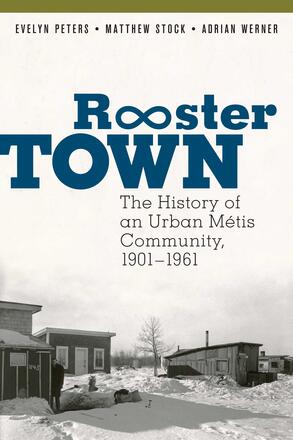
Rooster Town
The History of an Urban Métis Community, 1901–1961
Description
Melonville. Smokey Hollow. Bannock Town. Fort Tuyau. Little Chicago. Mud Flats. Pumpville. Tintown. La Couleeese were some of the names given to Métis communities at the edges of urban areas in Manitoba. Rooster Town, which was on the outskirts of southwest Winnipeg endured from 1901 to 1961. Those years in Winnipeg were characterized by the twin pressures of depression, and inflation, chronic housing shortages, and a spotty social support network. At the city’s edge, Rooster Town grew without city services as rural Métis arrived to participate in the urban economy and build their own houses while keeping Métis culture and community as a central part of their lives. In other growing settler cities, the Indigenous experience was largely characterized by removal and confinement. But the continuing presence of Métis living and working in the city, and the establishment of Rooster Town itself, made the Winnipeg experience unique. Rooster Town documents the story of a community rooted in kinship, culture, and historical circumstance, whose residents existed unofficially in the cracks of municipal bureaucracy, while navigating the legacy of settler colonialism and the demands of modernity and urbanization.
Reviews
“In addition to addressing the gap in scholarship regarding Métis urban experiences, and impressive attention to detail, the real strength of Rooster Town lies in its successful dismantling of colonial narratives that depict Indigenous people as out of place in modern urban society.”
- Chantal Fiola
“Winnipeg is haunted, appropriately, by Rooster Town. I am so glad we will soon have Evelyn Peters’ book to learn from and work with.”
- Adele Perry
"Rooster Town challenges the lingering mainstream belief that Indigenous people and their culture are incompatible with urban life and opens the door to a broader conversation about the insidious nature of racial stereotypes ubiquitous among the broader Canadian polity."
- Brenda Macdougall
"Very little is written about Indigenous urban histories. They are typically hidden, or erased, from the histories of Prairie cities, and Canadian cities generally. Rooster Town is an authoritative correction to that colonial erasure in the written record."
- Ryan Walker
"Places like Rooster Town are known and talked about within the contemporary Métis world—everybody knows somebody whose parents or grandparents came from these types of invisible and often marginalized communities-but there has been no acknowledgment of their existence within Canadian historical, geographic, sociological, or political scholarship."
- Brenda Macdougall